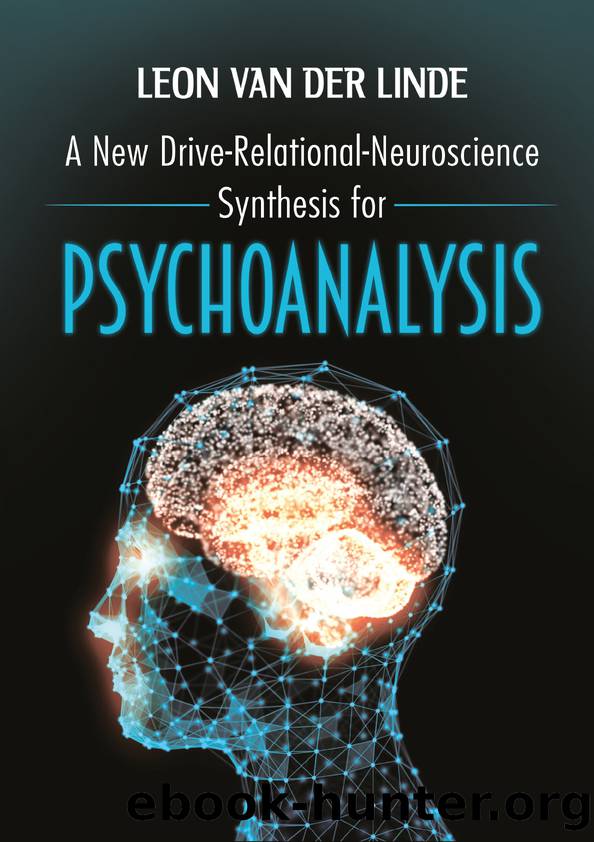A New Drive-Relational-Neuroscience Synthesis for Psychoanalysis by van der Linde Leon;

Author:van der Linde, Leon;
Language: eng
Format: epub
Publisher: Austin Macauley Publishers
Published: 2019-09-30T00:00:00+00:00
Kernberg (1976, 2001)
Whereas Slavin and Kriegman (1992) apply evolutionary design mechanisms as an attempted integrative measure, Kernberg (1976) accords âaffect dispositionsâ (p. 88) such an integrative role, claiming that affects are âthe primary motivations of behaviourâ (Kernberg, 2001, p. 604). Kernbergâs (1976, 2001) synthesis therefore sets out to âdevelop a contemporary psychoanalytic theoryâ (Kernberg, 2001, p. 605) by using affect theory as a frame of reference to integrate drive and object-relations theory.
Kernbergâs (1976, 2001) tripartite framework. Kernberg (1976) applies ânew findings in such fields as ethology, neurophysiology, psychophysiology of affect, and general learning theoryâ (p. 85) in his âreformulation of Freudâs dual instinct theoryâ (p. 86). This reformulation delineates a âtripartite structure of the mindâ (Kernberg, 2001, p. 604) seeing psychic function to be consolidated in an overall, âsuprasystemâ (Kernberg, 1976, p. 85) that regulates human behaviour, comprised of instinctual, object-relations and affective component systems or subsystems (p. 85).
According to Kernberg (1976), the first component system, namely instincts, is ârepresented by psychologically organised drive systemsâ (p. 85), described as âcomplex, hierarchical organizations of behaviour centred on major drive systems ⦠[such as] ... fight-flight, hunger, [and] sexâ (p. 86). These âinstinctive building blocksâ (p. 86) are considered to inform âinborn perceptive and behaviour patterns which determine early attachment, inborn affect dispositions (represented by the combined activation of hypothalamic and other reward or punishment centres), the nonspecific reticular activating systems, neurovegetative discharge patterns, and structured memory traces of increased extroceptive and introceptive perceptionsâ (pp. 86-87).
A second component system of the âpersonality at largeâ (Kernberg, 1976, p. 85) is comprised of units of âinternalized object relationsâ (p. 85). Kernberg (1976) proposes that during initial mother-infant interaction, âprimitive affect dispositions ... are activated in the context of [the infantâs establishing of] primitive units of internalized object relationsâ (p. 113). Such early âself-object-affect unitsâ (p. 87) are seen as âconstellations of affectively integrated and cognitively stored perceptions of affective, physiological, behavioural, and environmental changesâ (p. 87), albeit not fully differentiated. As these object-relations units gradually âbecome more complex structuresâ (p. 113) and co-differentiate along with the drives, they become intimately linked with the organisation of the âoverall psychic structuresâ (p. 113).
The third component of the overall, higher level psychological or suprasystems, comprises affect dispositions, which, according to Kernberg (1976), âconstitute the primary motivational systemsâ (p. 87), integrating âthe perception of (1) central (pleasurable or unpleasurable) states, (2) physiological discharge phenomena, (3) inborn perceptive and behaviour patterns, and (4) environmental responsesâ (p. 87). Kernberg contends that the intensity of the instincts and the degree of object representations âdepends on the constitutionally determined intensity of affect activation and ... the extent to which there is or is not an average, expectable environment, a sufficiency of primary maternal functionâ (pp. 88-89).
However, it is unclear how Kernberg (1976) can describe instincts as building blocks that determine inborn affect dispositions, but then proceed to accord affect a primary organising status. Similarly, given that Kernberg accepts that the intensity of affect activation is determined constitutionally, it is not clear how he can ignore the implication that affect is an ancillary function of endogenous drive operations.
Download
This site does not store any files on its server. We only index and link to content provided by other sites. Please contact the content providers to delete copyright contents if any and email us, we'll remove relevant links or contents immediately.
Through Windows of Opportunity : A Neuroaffective Approach to Child Psychotherapy by Marianne Bentzen; Susan Hart(942)
Overcoming ADHD Without Medication : A Guidebook for Parents and Teachers by Children and Natural Psychology Association for Youth; Children The Association for Youth(880)
Out of the Mainstream: Helping the Children of Parents with a Mental Illness by Loshak Rosemary;(875)
Delphi Collected Works of Sigmund Freud (Illustrated) by Sigmund Freud(634)
The Noom Mindset by Noom(587)
The 48 Laws of Mental Power: Overcoming Trauma and Building Mental Strength by Victor O. Carl(547)
The Psychology of Media and Politics by George Comstock & Erica Scharrer(475)
Sigmund Freud by Janet Sayers;(471)
MANIPULATION & MIND CONTROL: The Persuasion Collection: Dark Psychology Secrets, Analyze & Influence People with Nlp. How to learn Reading Friends and Develop Body Language Skills. by ROBERT TOWER(457)
Behold the Monster by Jillian Lauren(436)
It's nobody's fault: new hope and help for difficult children and their parents by Harold Koplewicz(434)
Totem and Taboo: Some Points of Agreement between the Mental Lives of Savages and Neurotics by Sigmund Freud(421)
The Hypnotic Coach: A Conversational Hypnotherapy Tool Kit by Marion Jess(418)
Directions in Technical Writing and Communication by Gould Jay R.;(411)
Mastering Flow: Perform Better, Experience More Joy, and Live a Happier Life by Nils Salzgeber(392)
THE PSYCHOLOGY OF ENTREPRENEURSHIP; New Perspectives by Michael M. Gielnik; Melissa S. Cardon; Michael Frese(383)
Mind Hacking Secrets and Unlimited Memory Power: 2 Books in 1: Learn How to Improve Your Memory & Develop Fast, Clear Thinking in 2 Weeks + 42 Brain Training Techniques & Memory Improvement Exercises by Sharp Scott(356)
Positive Psychology Across the Lifespan; An Existential Perspective by Piers Worth(354)
The Modern Young Man's Guide to Manhood by Wayne Walker(351)
